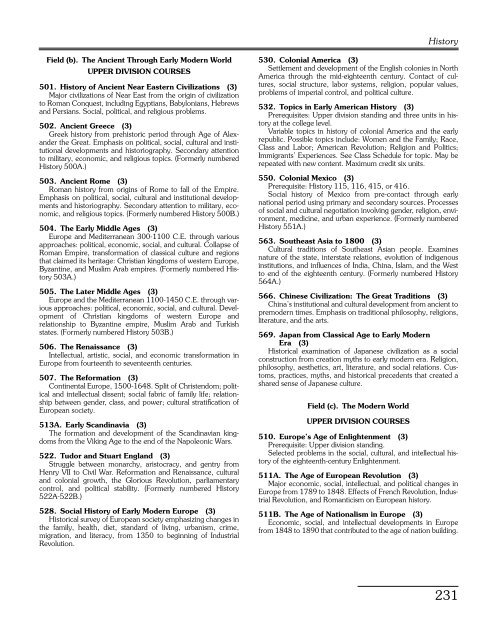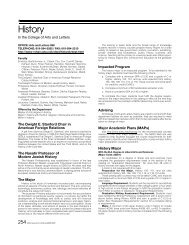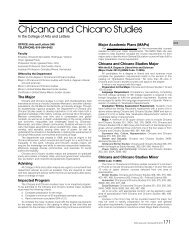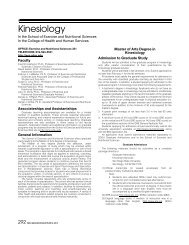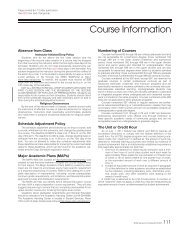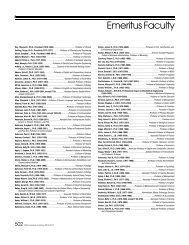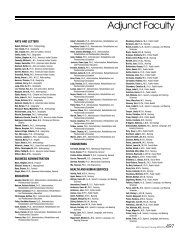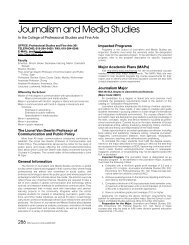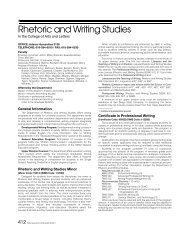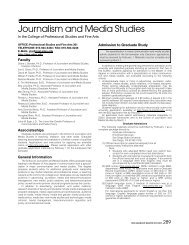President Stephen L. Weber - San Diego State University ...
President Stephen L. Weber - San Diego State University ...
President Stephen L. Weber - San Diego State University ...
You also want an ePaper? Increase the reach of your titles
YUMPU automatically turns print PDFs into web optimized ePapers that Google loves.
Field (b). The Ancient Through Early Modern World<br />
UPPER DIVISION COURSES<br />
501. History of Ancient Near Eastern Civilizations (3)<br />
Major civilizations of Near East from the origin of civilization<br />
to Roman Conquest, including Egyptians, Babylonians, Hebrews<br />
and Persians. Social, political, and religious problems.<br />
502. Ancient Greece (3)<br />
Greek history from prehistoric period through Age of Alexander<br />
the Great. Emphasis on political, social, cultural and institutional<br />
developments and historiography. Secondary attention<br />
to military, economic, and religious topics. (Formerly numbered<br />
History 500A.)<br />
503. Ancient Rome (3)<br />
Roman history from origins of Rome to fall of the Empire.<br />
Emphasis on political, social, cultural and institutional developments<br />
and historiography. Secondary attention to military, economic,<br />
and religious topics. (Formerly numbered History 500B.)<br />
504. The Early Middle Ages (3)<br />
Europe and Mediterranean 300-1100 C.E. through various<br />
approaches: political, economic, social, and cultural. Collapse of<br />
Roman Empire, transformation of classical culture and regions<br />
that claimed its heritage: Christian kingdoms of western Europe,<br />
Byzantine, and Muslim Arab empires. (Formerly numbered History<br />
503A.)<br />
505. The Later Middle Ages (3)<br />
Europe and the Mediterranean 1100-1450 C.E. through various<br />
approaches: political, economic, social, and cultural. Development<br />
of Christian kingdoms of western Europe and<br />
relationship to Byzantine empire, Muslim Arab and Turkish<br />
states. (Formerly numbered History 503B.)<br />
506. The Renaissance (3)<br />
Intellectual, artistic, social, and economic transformation in<br />
Europe from fourteenth to seventeenth centuries.<br />
507. The Reformation (3)<br />
Continental Europe, 1500-1648. Split of Christendom; political<br />
and intellectual dissent; social fabric of family life; relationship<br />
between gender, class, and power; cultural stratification of<br />
European society.<br />
513A. Early Scandinavia (3)<br />
The formation and development of the Scandinavian kingdoms<br />
from the Viking Age to the end of the Napoleonic Wars.<br />
522. Tudor and Stuart England (3)<br />
Struggle between monarchy, aristocracy, and gentry from<br />
Henry VII to Civil War. Reformation and Renaissance, cultural<br />
and colonial growth, the Glorious Revolution, parliamentary<br />
control, and political stability. (Formerly numbered History<br />
522A-522B.)<br />
528. Social History of Early Modern Europe (3)<br />
Historical survey of European society emphasizing changes in<br />
the family, health, diet, standard of living, urbanism, crime,<br />
migration, and literacy, from 1350 to beginning of Industrial<br />
Revolution.<br />
History<br />
530. Colonial America (3)<br />
Settlement and development of the English colonies in North<br />
America through the mid-eighteenth century. Contact of cultures,<br />
social structure, labor systems, religion, popular values,<br />
problems of imperial control, and political culture.<br />
532. Topics in Early American History (3)<br />
Prerequisites: Upper division standing and three units in history<br />
at the college level.<br />
Variable topics in history of colonial America and the early<br />
republic. Possible topics include: Women and the Family; Race,<br />
Class and Labor; American Revolution; Religion and Politics;<br />
Immigrants’ Experiences. See Class Schedule for topic. May be<br />
repeated with new content. Maximum credit six units.<br />
550. Colonial Mexico (3)<br />
Prerequisite: History 115, 116, 415, or 416.<br />
Social history of Mexico from pre-contact through early<br />
national period using primary and secondary sources. Processes<br />
of social and cultural negotiation involving gender, religion, environment,<br />
medicine, and urban experience. (Formerly numbered<br />
History 551A.)<br />
563. Southeast Asia to 1800 (3)<br />
Cultural traditions of Southeast Asian people. Examines<br />
nature of the state, interstate relations, evolution of indigenous<br />
institutions, and influences of India, China, Islam, and the West<br />
to end of the eighteenth century. (Formerly numbered History<br />
564A.)<br />
566. Chinese Civilization: The Great Traditions (3)<br />
China’s institutional and cultural development from ancient to<br />
premodern times. Emphasis on traditional philosophy, religions,<br />
literature, and the arts.<br />
569. Japan from Classical Age to Early Modern<br />
Era (3)<br />
Historical examination of Japanese civilization as a social<br />
construction from creation myths to early modern era. Religion,<br />
philosophy, aesthetics, art, literature, and social relations. Customs,<br />
practices, myths, and historical precedents that created a<br />
shared sense of Japanese culture.<br />
Field (c). The Modern World<br />
UPPER DIVISION COURSES<br />
510. Europe’s Age of Enlightenment (3)<br />
Prerequisite: Upper division standing.<br />
Selected problems in the social, cultural, and intellectual history<br />
of the eighteenth-century Enlightenment.<br />
511A. The Age of European Revolution (3)<br />
Major economic, social, intellectual, and political changes in<br />
Europe from 1789 to 1848. Effects of French Revolution, Industrial<br />
Revolution, and Romanticism on European history.<br />
511B. The Age of Nationalism in Europe (3)<br />
Economic, social, and intellectual developments in Europe<br />
from 1848 to 1890 that contributed to the age of nation building.<br />
231


